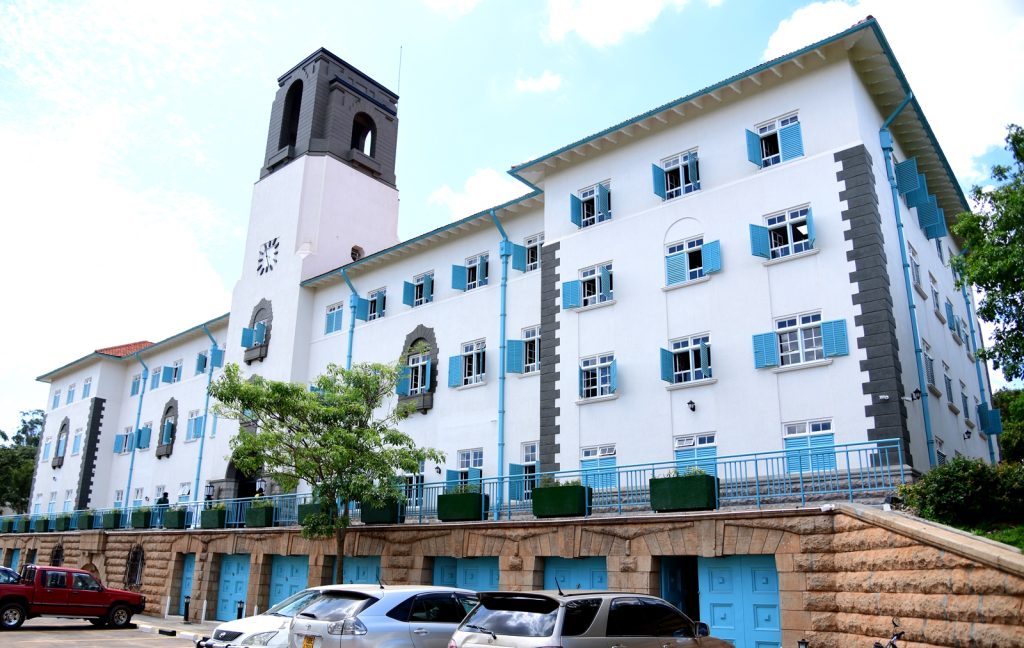SoL Curriculum Review
The School of Law, Makerere University conducted a Curriculum Review and Clinical Methodology Seminar from 23rd to 24th February 2018, an event that brought on board ideas aimed at improving the teaching and learning of Law in Makerere University.The review of the Law program that has been running for close to Fifty years, was a necessity in addressing theidentified gaps arising from the changing terrain local, regional and international where the products of the School of Law operate.
The Deputy Vice Chancellor, Academic Affairs Prof. Ernest Okello Ogwang, in his remarks at the event held at Premier Best Western Garden Hotel in Entebbe noted that regular self-evaluation and monitoring was important for any activity including the academia. ‘ We live in a world where knowledge and information are key drivers of development and progress” said the Deputy Vice Chancellor Academic affairs while applauding the School of Law for the initiative to review the curriculum.
He noted that the political, social, economic and technological terrains are not the same as in 1968 when the program started and that there was need for a thorough review and overhaul of the curricular in order to meaningfully contribute to the creation of new knowledge and a critical human resource base ,both key drivers of progress in society.
The seminar was organized mainly to track and complete the review process that started two years back to update the syllabus of the School of Law by introducing new study programs, new teaching methods, new modules and enable it address pertinent issues in the society.It was also aimed at sharing best practices and experiences in the use of practical methods in teaching as well as work out modalities for the use of Clinical methodologies.
According to Dr. Christopher Mbazira, the Principal School of Law, the review processwas timely given that Makerere University was in the process of reviewing and developing a new Strategic plan for the next ten years. He said it was important that School of Law followed suit by reviewing the syllabi, teaching methods, and the research agenda to remain relevant and to reposition herself as a center of legal knowledge transfer.
While addressing himself about the misconceptions that innovations are mainly in the sciences, Dr. Mbazira said there were many innovations in the humanities citing clinical methodologies as an example as demonstrated in the Public Interest Law Clinic, a successful innovation in the teaching of Law in Makerere University.
As one of the key mandates of the University, and in order to empower the staff with knowledge and skills, Prof. Joe Oloka Onyango conducted the participants through the processes of writing for publications both for academic and personal interests in his presentation entitled “Academics in the 21st Century: Publish or Perish”. He said for academics in Uganda today, there was a lot of grey area for writing citing areas like the history of law, and contemporary manifestations of the law, adding that academic writing is a skill which has to be learned.
At the end of the seminar, a number of issued were agreed upon, notable among them was the introduction of specialized Master of Laws Programs in the areas of Human Rights Law and Practice, Refugee Law, Petroleum and Energy Governance , Corporate and Commercial law, and more whose proposals were at different levels of development.
Staff was also in agreement to introduce the Clinical teaching methodologies in the programs taught drawing from the experience from the Public Interest Law Clinic and other law Clinics like the Witts Law Clinic whose experience was shared by Dr. Daven Dass, the Director of the Clinic.Other areas to be addressed included organizinga colloquium every semester for LL.D students to present their work to their cohorts and Faculty or where possible to integrate such presentations into the current staff seminar series. It was also agreed to adopt a new format for the supervision of LL.D students involving a more structured engagement with their supervisors based on the University of Exeter’s “Students’ Portal” Model as well as set out a clear publishing strategy for faculty members with peer support at Departmental level.The review meeting also agreed to streamline the Internship process and introduce elaborate orientation sessions for students before they go to their internship posts. The seminar was also facilitated by Prof. David McQuoid-Mason from the University of Kwazulu Natal Durban South Africa and Dr. Daven Dass, the Director Wits Law Clinic from South Africa, and Victor Chimbwanda from the Faculty of Law Wisconsin International University College in Ghana. The trio gave their experiences on the changing trends in legal education specifically addressing experiential learning in clinical legal methodologies and how such skills can be applied while teaching all programs at the School of Law.



